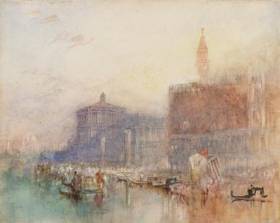Displaying items by tag: National Gallery of Ireland
#MarineArtist – This month of January is dedicated to the master of seacapes Turner with an exhibition of prints at the National Gallery of Ireland, Dublin, writes Jehan Ashmore.
The British painter Joseph Mallord William Turner (23 April 1775 – 19 December 1851) was synonymous with seascapes scenes of shipwrecks in tempestuous seas. Both brushstroke of sea and sky are captured by the master known as the ‘Painter of Light’ in which he challenged the style of the old masters by trailblazing in the technique and subject matter.
Turner has proved to be so popular with such evocative scenes along with landscapes that have captured the public imagination.
The National Gallery is showing the popular Vaughan Bequest of Turner’s watercolours in the print gallery.
Visitors will be able to view a selection of Turner’s 1807 Liber Studiorum prints divided into categories such as marine, architectural and epic pastoral.
As an English Romantic landscape painter, watercolourist and printmaker, Turner’s style is said to have paved the foundation for Impressionism. His prolific works of 19,000 oils, watercolours and drawings including elevated landscape painting that rose to his eminence rivalling history painting.
Turner was considered controversial for his day and unlike many artists then he proved to be very successful.
Most of his works were bequeathed to the British nation and the majority are held in the National Gallery and at the Tate Britain also in London. The venue at Millbank is also where the 'Tate Boat' connects downriver to the Tate Modern at Bankside operated by MBNA Thames Clipper fleet (see order newbuilds).
Lecture
This Sunday, 15 January, at the National Gallery of Ireland a lecture ‘Preparing Turner: behind the scenes of the Turner exhibition’ is to be presented by Rebecca de Bút at the gallery's Conservation Department.
Likewise of the exhibition the free lecture of almost an hour begins at (15.00hrs) in the Lecture Theatre.
Booking is not necessary. For a link to the NGI click here.
























































